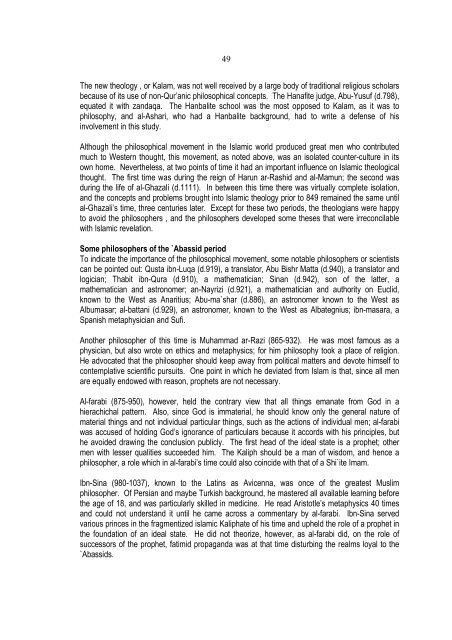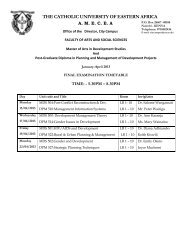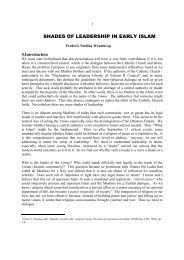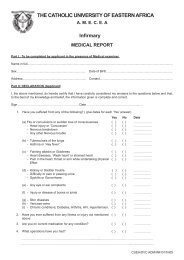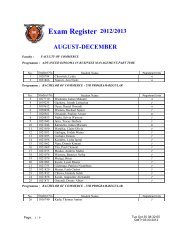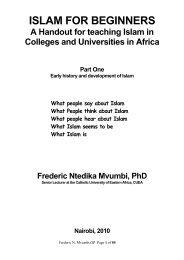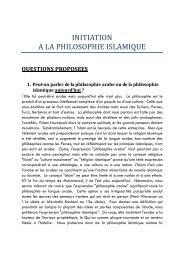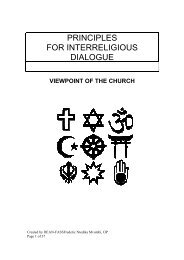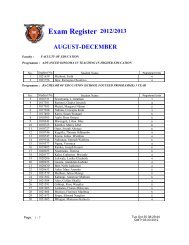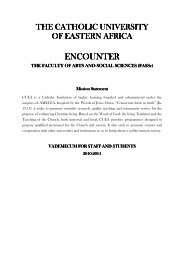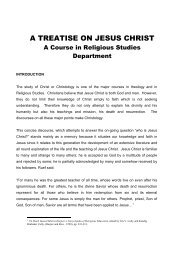INTRODUCTION TO ISLAMIC THEOLOGY.pdf - CUEA
INTRODUCTION TO ISLAMIC THEOLOGY.pdf - CUEA
INTRODUCTION TO ISLAMIC THEOLOGY.pdf - CUEA
Create successful ePaper yourself
Turn your PDF publications into a flip-book with our unique Google optimized e-Paper software.
49The new theology , or Kalam, was not well received by a large body of traditional religious scholarsbecause of its use of non-Qur’anic philosophical concepts. The Hanafite judge, Abu-Yusuf (d.798),equated it with zandaqa. The Hanbalite school was the most opposed to Kalam, as it was tophilosophy, and al-Ashari, who had a Hanbalite background, had to write a defense of hisinvolvement in this study.Although the philosophical movement in the Islamic world produced great men who contributedmuch to Western thought, this movement, as noted above, was an isolated counter-culture in itsown home. Nevertheless, at two points of time it had an important influence on Islamic theologicalthought. The first time was during the reign of Harun ar-Rashid and al-Mamun; the second wasduring the life of al-Ghazali (d.1111). In between this time there was virtually complete isolation,and the concepts and problems brought into Islamic theology prior to 849 remained the same untilal-Ghazali’s time, three centuries later. Except for these two periods, the theologians were happyto avoid the philosophers , and the philosophers developed some theses that were irreconcilablewith Islamic revelation.Some philosophers of the `Abassid periodTo indicate the importance of the philosophical movement, some notable philosophers or scientistscan be pointed out: Qusta ibn-Luqa (d.919), a translator, Abu Bishr Matta (d.940), a translator andlogician; Thabit ibn-Qura (d.910), a mathematician; Sinan (d.942), son of the latter, amathematician and astronomer; an-Nayrizi (d.921), a mathematician and authority on Euclid,known to the West as Anaritius; Abu-ma`shar (d.886), an astronomer known to the West asAlbumasar; al-battani (d.929), an astronomer, known to the West as Albategnius; ibn-masara, aSpanish metaphysician and Sufi.Another philosopher of this time is Muhammad ar-Razi (865-932). He was most famous as aphysician, but also wrote on ethics and metaphysics; for him philosophy took a place of religion.He advocated that the philosopher should keep away from political matters and devote himself tocontemplative scientific pursuits. One point in which he deviated from Islam is that, since all menare equally endowed with reason, prophets are not necessary.Al-farabi (875-950), however, held the contrary view that all things emanate from God in ahierachichal pattern. Also, since God is immaterial, he should know only the general nature ofmaterial things and not individual particular things, such as the actions of individual men; al-farabiwas accused of holding God’s ignorance of particulars because it accords with his principles, buthe avoided drawing the conclusion publicly. The first head of the ideal state is a prophet; othermen with lesser qualities succeeded him. The Kaliph should be a man of wisdom, and hence aphilosopher, a role which in al-farabi’s time could also coincide with that of a Shi`ite Imam.Ibn-Sina (980-1037), known to the Latins as Avicenna, was once of the greatest Muslimphilosopher. Of Persian and maybe Turkish background, he mastered all available learning beforethe age of 18, and was particularly skilled in medicine. He read Aristotle’s metaphysics 40 timesand could not understand it until he came across a commentary by al-farabi. Ibn-Sina servedvarious princes in the fragmentized islamic Kaliphate of his time and upheld the role of a prophet inthe foundation of an ideal state. He did not theorize, however, as al-farabi did, on the role ofsuccessors of the prophet, fatimid propaganda was at that time disturbing the realms loyal to the`Abassids.


